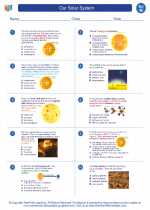Atmosphere
The atmosphere is a layer of gases that surround the Earth. It is held in place by the force of gravity and plays a crucial role in supporting life on our planet. The atmosphere is made up of several different layers, each with its own unique characteristics and functions.
Composition of the Atmosphere
The Earth's atmosphere is primarily composed of nitrogen (78%) and oxygen (21%), with trace amounts of other gases such as carbon dioxide, argon, and water vapor. These gases are essential for supporting life and regulating the Earth's climate.
Layers of the Atmosphere
The atmosphere is divided into several layers based on temperature and composition. These layers include the troposphere, stratosphere, mesosphere, thermosphere, and exosphere. Each layer has distinct properties and plays a specific role in regulating the Earth's environment.
Functions of the Atmosphere
- Protection: The atmosphere provides a shield against harmful solar radiation, meteoroids, and space debris.
- Regulation of Temperature: The atmosphere helps regulate the Earth's temperature by trapping heat from the sun and preventing it from escaping into space.
- Supporting Life: The presence of oxygen and other gases in the atmosphere is essential for supporting life on Earth.
- Weather and Climate: The atmosphere plays a crucial role in determining weather patterns and global climate through processes such as convection, evaporation, and precipitation.
Study Guide
To study the atmosphere, it is important to understand the composition, layers, and functions of the Earth's atmosphere. Here are some key points to focus on:
- What are the main components of the Earth's atmosphere?
- How are the layers of the atmosphere defined and what are their unique characteristics?
- What are the key functions of the atmosphere in supporting life and regulating the Earth's environment?
- How do processes such as convection, evaporation, and precipitation contribute to weather and climate?
By understanding these concepts, you will gain a deeper insight into the importance of the atmosphere and its role in sustaining life on Earth.
[Atmosphere] Related Worksheets and Study Guides:
.◂Science Worksheets and Study Guides Eighth Grade. Our Solar System

 Worksheet/Answer key
Worksheet/Answer key
 Worksheet/Answer key
Worksheet/Answer key
